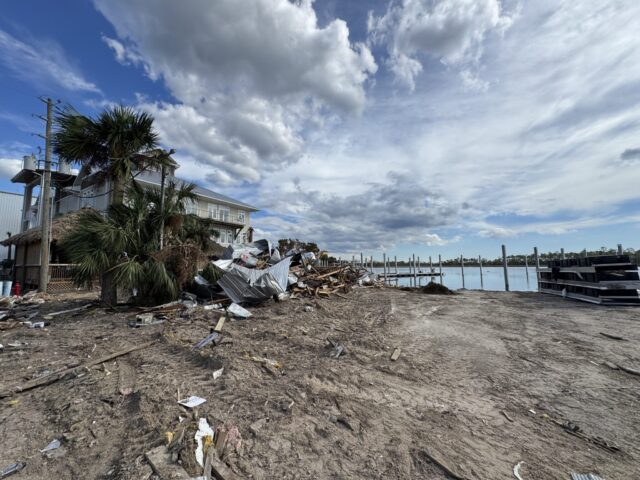
Testimony from the author of the 2022 report detailing how Florida property insurers gave millions to shareholders and billions to out-of-state affiliates while claiming financial ruin left some lawmakers on a House panel Thursday feeling like insurance regulators had lied to them.
The report at issue has prompted legislators to seek greater oversight over the flow of money from insurers to affiliates. House members have also questioned former and sitting insurance commissioners, who struggled to explain why they didn’t bring attention to the reports’ findings in 2022.
Jan Moenck, who wrote the report for Risk & Regulatory Consulting, told the Insurance & Banking Subcommittee Thursday that the firm submitted to the Office of Insurance Regulation its final draft on April 1, 2022, and didn’t receive any feedback or requests for changes, so RRC considered its work done.
That statement from Moenck prompted more questions from committee members, who heard testimony in March from OIR’s former and sitting heads that the report hadn’t been published because it was a draft and needed further review before release.
“You’re at your final draft, so it is inaccurate for them to have said you were not finished. So either they weren’t telling us the truth or you weren’t telling the truth. Which one was that?” Riverview Republican Rep. Danny Alvarez asked Moenck.
“In our mind, we had our final draft,” Moenck responded under oath.
House wants to dig deeper
The report sat until a Tampa Bay Times article brought it to the surface, highlighting how property insurers claimed losses following hurricanes Irma in 2017 and Michael in 2018, yet had paid $680 million in dividends to shareholders and billions in fees to affiliated companies for basic services.
The panel signaled that it would try to get more answers from OIR, with the subcommittee chair, Port Richey Republican Rep. Brad Yeager, telling reporters that the lack of communication from the regulating office after RRC submitted the final draft was telling.
 The House Insurance & Banking Subcommittee hears testimony on April 3, 2025, from the author of the 2022 report about property insurers’ financial practices. (Photo by Jackie Llanos/Florida Phoenix)
The House Insurance & Banking Subcommittee hears testimony on April 3, 2025, from the author of the 2022 report about property insurers’ financial practices. (Photo by Jackie Llanos/Florida Phoenix)Additionally, Yeager said, House Speaker Daniel Perez had authorized the subcommittee to find a firm to investigate shortcomings in the way regulators monitor insurer-affiliate relationships.
Tampa Democratic Rep. Dianne Hart, during the Thursday meeting, asked whether there would be more testimony from OIR.
“What is being revealed basically says they lied to us. They had a completed report and did not let us know that it was completed,” she said.
Not all lawmakers are convinced the Legislature should continue delving into the affiliate relationships. Delray Beach Republican Rep. Mike Caruso, a close ally of Gov. Ron DeSantis, used air quotes when talking about the investigation House Speaker Daniel Perez called for the subcommittee to carry out.
Caruso said some of the insurance companies that appeared to siphon money to their affiliates were paying them to do all of the claims processing.
What is OIR saying?
But OIR Commissioner Michael Yaworsky, who assumed the role in early 2023, rejected the notion in a phone interview with the Phoenix that he lied to lawmakers. He told the panel on March 14 that OIR in 2022 was dealing with the insolvency of several companies and investigating other insurers.
“If there’s a thought out there that OIR, or an OIR employee, or myself lied to them, that’s just not accurate,” Yawaorsky said. “I think what we’re getting caught up in is the mechanics of how projects such as these are completed, typically.”

The commissioner maintains that the report doesn’t provide a full picture because several insurers didn’t provide any or all information required for the analysis, which he emphasized wasn’t Moenck’s fault.
“There was extensive back and forth between the office and Moenck up to a certain point, and I think it seemed like it was the point that the market was collapsing that that communication stopped,” he said. “It did seem to stop at a point with no additional follow-ups.”
David Altmaier, OIR commissioner in 2022, echoed Yaworsky’s sentiment about the frenzy in the industry at the time the office received the report.
“Hindsight being 20/20, there’s probably some opportunities where I could have poked a little bit to make sure that this work was continuing. But, as the commissioner said, we were dealing with a lot,” Altmaier told lawmakers last month.
Months after the office had the report, the Legislature met for a special session in December that resulted in changes making it harder for policyholders to sue insurers, who claimed frivolous lawsuits drove up insurance premiums.
Lawmakers in the Insurance & Banking Subcommittee advanced a proposal, HB 881, that would require insurers to demonstrate that fees, commissions, and other payments to affiliates are fair and reasonable. The statutory lack of definition of fair and reasonable fees has also been at the center of discussions in the Legislature this year.
The bill approved Thursday states that when weighing whether a fee or commission is fair and reasonable, OIR must look at the actual cost of the service the affiliate provided to the insurer, the financial condition of both companies, the level of debt, the amount and purpose of payments and dividends, whether the contract benefits the insurer, and other information the office needs to made the determination.
However, similar bills appear stalled in the Senate at the midway point of the session.
Yaworsky said the office would have a difficult time complying with a legislative demand to produce a similar report with more recent data.
“We’re a pretty cash-strapped agency, and the House currently has us set to lose 20 full-time employees in their budget,” he said.
Disclaimer
Artificial Intelligence Disclosure & Legal Disclaimer
AI Content Policy.
To provide our readers with timely and comprehensive coverage, South Florida Reporter uses artificial intelligence (AI) to assist in producing certain articles and visual content.
Articles: AI may be used to assist in research, structural drafting, or data analysis. All AI-assisted text is reviewed and edited by our team to ensure accuracy and adherence to our editorial standards.
Images: Any imagery generated or significantly altered by AI is clearly marked with a disclaimer or watermark to distinguish it from traditional photography or editorial illustrations.
General Disclaimer
The information contained in South Florida Reporter is for general information purposes only.
South Florida Reporter assumes no responsibility for errors or omissions in the contents of the Service. In no event shall South Florida Reporter be liable for any special, direct, indirect, consequential, or incidental damages or any damages whatsoever, whether in an action of contract, negligence or other tort, arising out of or in connection with the use of the Service or the contents of the Service.
The Company reserves the right to make additions, deletions, or modifications to the contents of the Service at any time without prior notice. The Company does not warrant that the Service is free of viruses or other harmful components.












